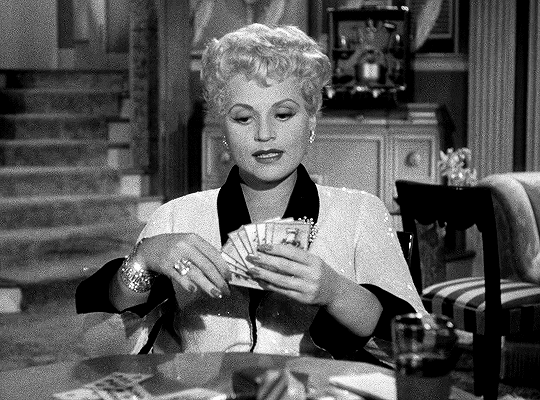 Born Yesterday (1950)
Jim Devery: All you have to do is be nice - and no rough language.
Billie: I won't open my mush.
Born Yesterday (1950)
Jim Devery: All you have to do is be nice - and no rough language.
Billie: I won't open my mush.
Many a time, it has been remarked upon how tricky it is to pick a Comedy for an HoF being as subjective as it is. Though it could easily be said about -- pretty much everything, it does seem to hinge directly on it a little more so.
But when it works. . . Man, oh, man!!
And this truly f@ckin works for me.
It all comes down to the genius of Judy Holliday's portrayal of the comedic "ditzy blonde." Along with her "straight man," Broderick Crawford. Their bombastic relationship being the fodder of every scene that brought forth an eruption of laughter out of me. Creating a comedic duo that matches the echelon of many Vauldvillin/Burlesque Comedy Teams of previous decades. Their arguing reminding me of a marriage of Burns & Allen and the tv show, The Honeymooners, when Jackie Gleason and Audrey Meadows would go at it.
Sheer brilliance.
My absolute favorite is the Card Game Scene which I've seen versions of/tip of the hats to, such as on
All of the Family with Archie (Carol O'Connor) and Edith Bunker (Jean Stapleton).
But Judy's Holliday's Billie Dawn is more than happy to yell back, unlike the more compliant Edith.
WARNING: "Though, unlike the other examples," spoilers below
the threat of violence does, in one pivotal scene, is followed through. Its effectiveness to the storyline's process is, like everything else, very essential. Not one I would like to have, but one I would not remove either due to the reason stated.
the threat of violence does, in one pivotal scene, is followed through. Its effectiveness to the storyline's process is, like everything else, very essential. Not one I would like to have, but one I would not remove either due to the reason stated.
To continue my raving of Judy Holliday and her genius, and it is just that. Her every nuance of voice, manner, body language, et al. is a true mastery of the art form. A woman of a 170 IQ, Holliday had stated numerous times that
"It takes real smarts to make people believe you're dumb." Extending that necessary intelligence to
"keep an audience's attention without extraordinary physical equipment." And she does. In spades!
It is said that: "searching for subversives in the film industry the House Un-American Activities Committee (HUAC) was
flummoxed (I f@ckin LOVE that description) by Holliday, who essentially played her Oscar-winning character "Billie Dawn" on the witness stand."
YOU GO, GIRL!
Director Cukor, to tighten and perfect the comedic timing while the set was being constructed he had the cast perform, again and again before a live audience. That timing shines through with everyone.
I should also note that William Holden is also in this as the man Broderick's character hires to teach Billie manners/book smarts and ends up severely regretting it. Holding his own to these two scene-stealers that kept my full attention.
I don't care WHO it is that nominated this, but whoever you are, you're getting a BIG FAT kiss and a hug from me!
THANK YOU!!
 Check out my podcast:
Check out my podcast: .jpg?bwg=1547380262)







